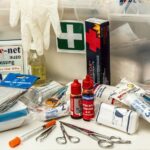Rheumatoid arthritis is a chronic inflammatory condition that primarily affects the joints. Seropositive RA is the most common type.
This condition is diagnosed when a person has antibodies in their blood which help to identify the disease. These antibodies are known as anti-cyclic citrullinated proteins (anti-CCPs), or rheumatoid factor (RF). These antibodies can be present in one or both of the following. They can cause inflammation in the joints and RA symptoms.
Must Read: healthy lifestyles programs
Those suffering from seronegative RA do not have these antibodies, but they still show symptoms of classic RA.
What are the signs and symptoms of seropositive RA
Both seropositive RA and seronegative RA can have a specific set of symptoms. These symptoms may change over time. RA patients will often test positive for rheumatoid factors within one year of developing symptoms.
Never Miss: how to save money on health insurance
Anti-CCPs can be more sensitive than other symptoms and may show up years before symptoms appear. RA symptoms include:
- There is swelling and pain in many joints, especially the hands and feet.
- Around 45 minutes of stiffness during the morning
- Deterioration of the bone and cartilage (determined using X-rays).
- Development of lumpy skin under the skin close to the joints (rheumatoid nosdules).
Other symptoms of RA can be present in conjunction with other conditions. These are:
- A slight fever
- Frequent infections
- constant fatigue
- Depression
- anemia
- Eye inflammation
- Dry eyes and dry mouth
What is seropositive RA?
To determine if you have anti-CCPs and rheumatoid factor, your blood will be tested. There is a 70% to 80% chance that your test will come back positive for RA.
Also Read: benefits of personal health records
Positive results may indicate other conditions. A positive test is not enough to diagnose RA. To receive a full diagnosis, you must also show the signs and symptoms of RA.
If joint damage or erosion is suspected, X-rays can show bone and cartilage degeneration. To determine the degree of inflammation in the joints, additional blood tests may be performed.
What is the prognosis of seropositive RA symptoms?
Seropositive RA patients are more likely to experience severe symptoms than seronegative RA patients, but this is not always true.
Seropositive RA patients are more likely than others to develop:
- rheumatoid nodules
- Vasculitis
- Rheumatoid lung issues
They are also more likely to develop associated conditions like cardiovascular disease.
The progression of the disease is unpredictable and dependent on many factors. It is impossible to predict the future.
There are many treatment options
There is currently no cure for seropositive RA. Treatment focuses on managing the pain and inflammation, and preventing further damage to your joints.
Treatment for seropositive RA has traditionally included a combination therapy, home care, medication and surgery.
Therapy
Paramedical specialists can help with RA management. Physical therapists and occupational therapists can help to change daily habits to lessen stress on the joints.
Special tools and devices are available that can assist you in your daily life while also limiting damage to your joints.
Home care
Regular exercise is a must for those suffering from seropositive RA. Exercise can help keep your joints mobile and strengthen your muscles.
To control inflammation and pain, you can try cold and hot compresses if you are experiencing flare-ups.
Medication
The most common type of medication for seropositive RA treatment is the disease-modifying antirheumatic drugs (DMARD) therapy. This class of drugs can help slow down the progression of RA and prevent further joint damage. Methotrexate is the most well-known DMARD.
Nonsteroidal anti-inflammatory drug (NSAIDs), such as ibuprofen, can be used to manage inflammation and pain.
Prednisone and other steroids are effective in controlling major inflammation flares. They should be monitored closely and tapered to the lowest dose possible. Once flares have subsided, they should be discontinued.
Most Popular: health diary a friend in need
Surgery
Surgery may be an option if the damage to your joints is severe. Surgery can be used to improve mobility and relieve pain in severely damaged joints. Sometimes, it is necessary to completely replace the joints.
Surgery can lead to complications like infection. Surgery is not recommended unless the risks are outweighed by the benefits.






